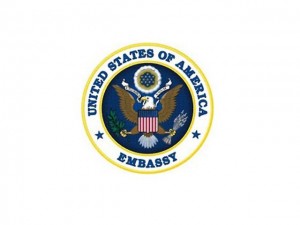US,Pakistan to fight wheat diseases to improve rural livelihoods
Wednesday, May 8th, 2013 5:59:13 by Tahir Khan
U.S. Ambassador Richard Olson has reaffirmed the United States government’s long-term support to farming communities in Pakistan.
“Since the 1950s, the United States has been working to support agriculture in Pakistan, introducing the Kinnow orange and helping to double Pakistan’s wheat production. Today, we continue our support because improving crop yields, protecting food sources from disease, and boosting milk production will increase farmers’ incomes, improve nutrition, and ultimately strengthen Pakistan’s prosperity.”
Addressing a gathering of government officials, researchers, and farmers during his visit to the National Agriculture Research Center (NARC) on Wednesday, which was established with the help of the U.S. government in the 1980s, Ambassador Olson said, “The United States is committed to helping the small farmers of Pakistan through projects that enhance agricultural productivity.”
The Ambassador lauded the progress made by the Wheat Productivity Enhancement Project (WPEP), a United States Department of Agriculture (USDA) program managed in collaboration with national and provincial research partners that has successfully introduced the UG 99-resistant wheat variety, “NARC 2011.”
The introduction of this wheat variety helps protect Pakistan against UG 99, a virulent wheat disease in the region that poses a threat to Pakistan’s farming community. “Wheat accounts for approximately 60 percent of the daily caloric intake of the average Pakistani, so our joint efforts to combat this disease are critical,” said Ambassador Olson.
“The Wheat Productivity Enhancement Project team and Pakistani scientists at national and provincial research stations have made great progress in the fight against wheat rusts, and I encourage you to continue your work together.”
In addition to support for the Wheat Productivity Enhancement Project, the United States has provided new harvesting machines and funded improvements to research stations around Pakistan to develop more disease-resistant wheat varieties. The United States also provides specialized training opportunities to Pakistani wheat scientists.
Dr. Muhammad Imtiaz, Country Liaison Officer for the International Maize and Wheat Improvement Center, noted that without disease-resistant varieties of wheat, such as the one being harvested at NARC, experts estimate that Pakistan’s annual wheat harvest could be reduced by as much as 50 percent if and when UG 99 arrives. “Agriculture contributes 21 percent to the GDP of Pakistan and employs 45 percent of the labor force, making it one of the most significant economic drivers of Pakistan,” Dr. Imtiaz said. Pakistani farmers grew about 24 million tons of wheat on eight million hectares last year, accounting for about 2.4 percent of the GDP.
“The United States and Pakistan have similar agricultural systems, and for that reason we have been effective partners in agriculture for more than half a century, working together to improve agricultural yields and to combat disease,” said Ambassador Olson. “Since the 1950s, U.S. and Pakistani scientists have collaborated to increase wheat production. At that time, Dr. Manzoor Bajwa and Dr. Norman Borlaug worked together to develop ‘Mexi-Pak,’ the wheat variety that started the Green Revolution in Pakistan and helped to double Pakistan’s wheat production between 1965 and 1970.”
Tags: National Agriculture Research Center, U.S. Ambassador Richard Olson, United States Department of Agriculture, US Embassy
Short URL: https://www.newspakistan.pk/?p=40166


















USA support means GM foods and Monsanto seeds. Totally dangerous. Check out monasanto harvested grain fed to rates which developed cancerous tumours. Never forget USA is Zionist state now and all these USA officials just agents of them. They want to control seeds of all world agriculture products.